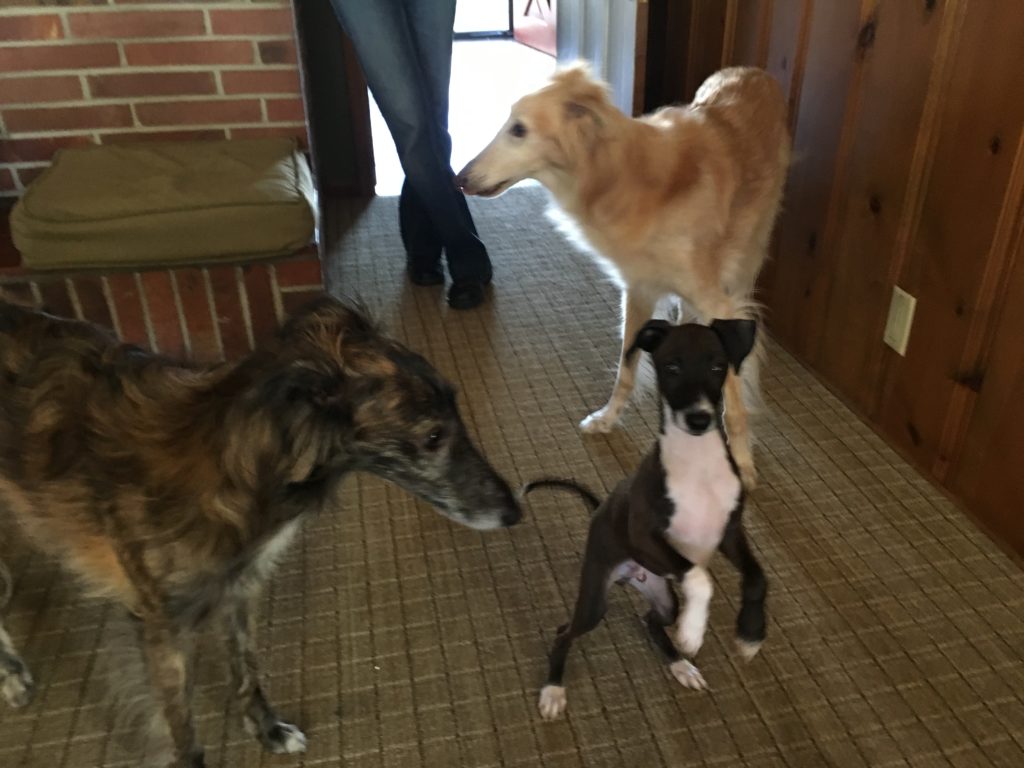Helping a Trio of Timid Dogs By Building Up Their Self Esteem and Confidence
By: David Codr
Published Date: November 21, 2016
Kindle (left) and Timbo (Right top) are a pair of Silken Windhounds in Omaha who recently welcomed four-month-old Italian Greyhound Pippin into their pack. Their guardians set up a dog and puppy behavior training session with me to address some issues that have surfaced since the puppy’s arrival; Kindle playing too rough with the puppy and Timbo’s aloofness or disinterest in Pippin.
Pippin was out back with one of his guardians when I arrived for the session so I got to meet Kindle and Timbo sans puppy. At first glance, they showed good curiosity and confidence, coming up to greet and sniff me without being overly excited.
Pippin was much more reserved when he came inside to find me in the living room. I avoided direct eye contact and ended up taking a seat on the floor to make myself more approachable.
Once all the dogs were in the room, I noticed that both Kindle and Pippin remained more reserved and cautious than the situation warranted.
There was a garage sale going on right across the street and that captivated most of Timbo’s attention. But when the dogs were in the room with me they were far more reserved than what is considered normal.
Because Pippin’s issues were the catalyst for the session, we started out with him. As is the case for most puppy guardians, potty training was near the top of the list so I spent a couple of minutes going over some potty training tips.
By consistently rewarding Pippin for the desired potty results, it shouldn’t take him long to figure out that he needs to potty outside.
As we were wrapping up the potty training discussion, I started noticing that the guardians were pretty proactive in terms of their interactions with the dogs. When a treat was dropped, they immediately pointed to where it was, adjusted their seated position if it conflicted with the dog’s, talked to them very tenderly with a smudge of baby talk.
None of theses things by themselves are cause for concern, but as the session went on, I started to become a little concerned that the guardians were over protecting their dogs. Now because of brittle bones, its necessary to disagree with some over excited behavior and activities for the health of your dog. That was certainly the case here.
But if you are too proactive in terms to not letting the dogs play and have some romping fun, it can cause the dogs to seek out that behavior even more. I recommended that the guardians look for ways to exercise Pippin and Kindle independently of one another when Kindle starts to play too roughly with Pippin. A better strategy would be to provide the dogs with the requisite amount of exercise.
As we continued the appointment, I learned that the guardians sometimes petted the dogs to try to comfort or soothe them when they were fearful or insecure. While this is a normal human assumption, any time we pet a dog, we are reinforcing whatever state of mind they are in when we pet them. So if you pet an anxious or fearful dog, more of that behavior is what you will get.
To help the guardians start petting their dogs in a more positive way, I suggested that they start petting with a purpose. This involves asking the dogs to do something to earn their affection or attention like sitting or laying down. This will change petting them from reinforcing unwanted mindsets at times to helping the dog feel good about earning their reward.
I also advised the guardians stop catering to the dogs quite so much. Nice is one thing, but the guardians, while having the best of intentions, had gone a bit too far. It appeared that they were so soft with their interactions with the dogs, that it was effecting their behavior. Its hard to articulate exactly what I was seeing. It was almost akin to a mother who is overly protective of their child.
While its nice to help each other out, sometimes its helpful for us to figure out things ourselves. When this happens, it leads to self confidence; something Pippin and Kindle were lacking. I recommended that the guardians try to be more patient and try to let the dogs solve problems and figure some things out on their own. This will help build up a dog’s confidence.
As the session progressed, it became clear that Kindle and Pippin were sensitive dogs. This was more pronounced in Kindle. Even getting him to come over once I was in the living room was too much for her. This was not an appropriate behavior, especially considering the fact that she came up and gave me a good sniff without any coaxing when I arrived from the session.
I spent several minutes motivating her to come over to me using positive reinforcement, patience and some basic dog psychology.
I was growing more concerned that Pippin’s cautiousness may be related to his observance of Kindle. My concern was that in addition to petting the dogs when anxious or nervous, the protective and helpful interactions with the humans may be hindering the dog’s social and psychological development.
I asked some additional questions about the dog’s daily lives and their knowledge base. If dogs lack a purpose or jobs to do, it can be somewhat deflating or sap motivation.
I learned that the dogs really only had some very basic commands down so I suggested that the guardians start taking turns teaching the dogs a new trick each week. By taking each dog off to the side to do some one on one work, the guardians can start developing a different sort of relationship with the dogs; as a teacher.
In addition to helping the humans interact with the dogs in a different way, mastering a few new tricks or commands can help the dogs come out of their shell a little bit. Dogs get a feeling of accomplishment when they learn a new skill and this could be just what the Dr ordered for Pippin and Kindle’s overly reserved nature.
To help the guardians get started, I spent a few minutes teaching Pippin some basics; sit, come and lay down. I recommended that the guardians continue practicing these basic training exercises and also reward the dogs when they engaged in desired behaviors, even when unsolicited.
If you pet your dog and say the word “here,” or “come” (one or the other) every time they come to you, this reinforced the recall command. It only takes a second to pet your dog and say “come,” but each time you do, it is a mini dog training or puppy training session. Get into a habit of doing this and its something you will continue over the rest of your dog’s life.
Because of how timid Kindle was, I wanted to show the guardians a simple Focus exercise that will help them redirect her.
Dogs can only focus on one thing at a time. So if the guardians can call Kindle over and practice the Focus exercise instead of petting her when she feels anxious or nervous, they will be helping her in multiple ways at the same time.
Kindle wasn’t a natural at the Focus exercise, but as her guardians continue to practice it, she will continue to improve. This should help give her self esteem a boost and be a very useful command to use to help her stop dwelling on insecurities.
The guardians enrolled Pippin in the Dog Gone Problems Puppy Socialization class which will help him with basic skills, obedience training and puppy socialization. Additionally, learning how to interact with new dogs without the influence of Kindle’s overly reserved nature should be very beneficial.
By the end of the session, Kindle was much more relaxed and comfortable, Pippin was sitting and recalling on command and the guardians had learned new ways to communicate and lead their dogs. If the guardians can get into a habit of leading their dogs into solving their own problems, pet them with a purpose and build up their confidence by teaching them some new tricks and commands, their timidness should be replaced by a trio of confident and responsive dogs.
Categorized in: Dog Behavior


